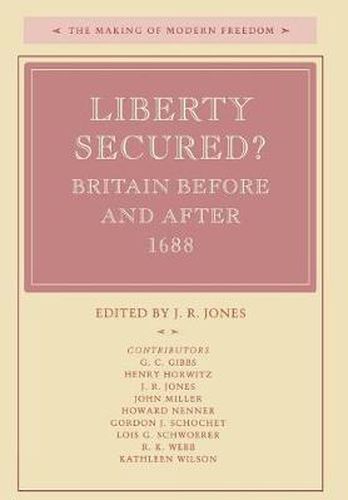Readings Newsletter
Become a Readings Member to make your shopping experience even easier.
Sign in or sign up for free!
You’re not far away from qualifying for FREE standard shipping within Australia
You’ve qualified for FREE standard shipping within Australia
The cart is loading…






Historians writing in the nineteenth century about the Revolution of 1688-1689 presented it as an event of central importance in the history not only of Britain but of the whole world. Such an interpretation now seems outdated, and a great deal of attention has been switched to the English revolution of the 1640’s and 1650’s on the grounds that developments in the earlier period possess much wider and more fundamental significance. The authors of the nine essays in this volume, the second in the series The Making of Modern Freedom, do not claim that the Revolution of 1688-89 in itself constituted an epoch-making event in an unfolding history of progress and freedom. They see the Revolution as a stage - although an important stage with many and long-term effects - in the processes of change that were affecting virtually all aspects of English life in the last decades of the seventeenth century. It marked a conjunction of many trends, changes, and developments in the years before and after 1688. J. R. Jones begins the volume with a comparative examination of English liberties with government depended on representative principles and practice - the Dutch Republic. The next two papers deal with the 1689 convention, summoned to secure liberties and rights which James II had tried to alter. Howard Nenner describes the significant changes in the character (or tenure) of the rights of subjects vis a vis sovereigns, and John Miller shows how in many respects the revolution settlement was a set of compromises that were illogical and, in the view of the radical Whigs, incomplete. Two sets of linked chapters examine areas of life in which the revolution brought no formal securing of rights, freedom of the press and religious liberty. Lois G. Schwoerer considers the attitudes of successive governments toward the press up to the lapsing of the Licensing Act in 1695, and G. C. Gibbs describes what followed this end of prepublication censorship. Gordon J. Schochet reconstructs the intellectual context of the Toleration Act of 1689, and R. K. Webb traces the progress from grudging acceptance of religious diversity to the inauguration of religious liberty in the next century and a half. The final papers explore two other aspects of change during the next century that stemmed from the Revolution. H enry Horwitz examines modifications in the theory and practice of law, ad Kathleen Wilson analyzes the movements pressing for political reform and the debates that saw the articulation of new concepts of liberty.<
$9.00 standard shipping within Australia
FREE standard shipping within Australia for orders over $100.00
Express & International shipping calculated at checkout
Historians writing in the nineteenth century about the Revolution of 1688-1689 presented it as an event of central importance in the history not only of Britain but of the whole world. Such an interpretation now seems outdated, and a great deal of attention has been switched to the English revolution of the 1640’s and 1650’s on the grounds that developments in the earlier period possess much wider and more fundamental significance. The authors of the nine essays in this volume, the second in the series The Making of Modern Freedom, do not claim that the Revolution of 1688-89 in itself constituted an epoch-making event in an unfolding history of progress and freedom. They see the Revolution as a stage - although an important stage with many and long-term effects - in the processes of change that were affecting virtually all aspects of English life in the last decades of the seventeenth century. It marked a conjunction of many trends, changes, and developments in the years before and after 1688. J. R. Jones begins the volume with a comparative examination of English liberties with government depended on representative principles and practice - the Dutch Republic. The next two papers deal with the 1689 convention, summoned to secure liberties and rights which James II had tried to alter. Howard Nenner describes the significant changes in the character (or tenure) of the rights of subjects vis a vis sovereigns, and John Miller shows how in many respects the revolution settlement was a set of compromises that were illogical and, in the view of the radical Whigs, incomplete. Two sets of linked chapters examine areas of life in which the revolution brought no formal securing of rights, freedom of the press and religious liberty. Lois G. Schwoerer considers the attitudes of successive governments toward the press up to the lapsing of the Licensing Act in 1695, and G. C. Gibbs describes what followed this end of prepublication censorship. Gordon J. Schochet reconstructs the intellectual context of the Toleration Act of 1689, and R. K. Webb traces the progress from grudging acceptance of religious diversity to the inauguration of religious liberty in the next century and a half. The final papers explore two other aspects of change during the next century that stemmed from the Revolution. H enry Horwitz examines modifications in the theory and practice of law, ad Kathleen Wilson analyzes the movements pressing for political reform and the debates that saw the articulation of new concepts of liberty.<